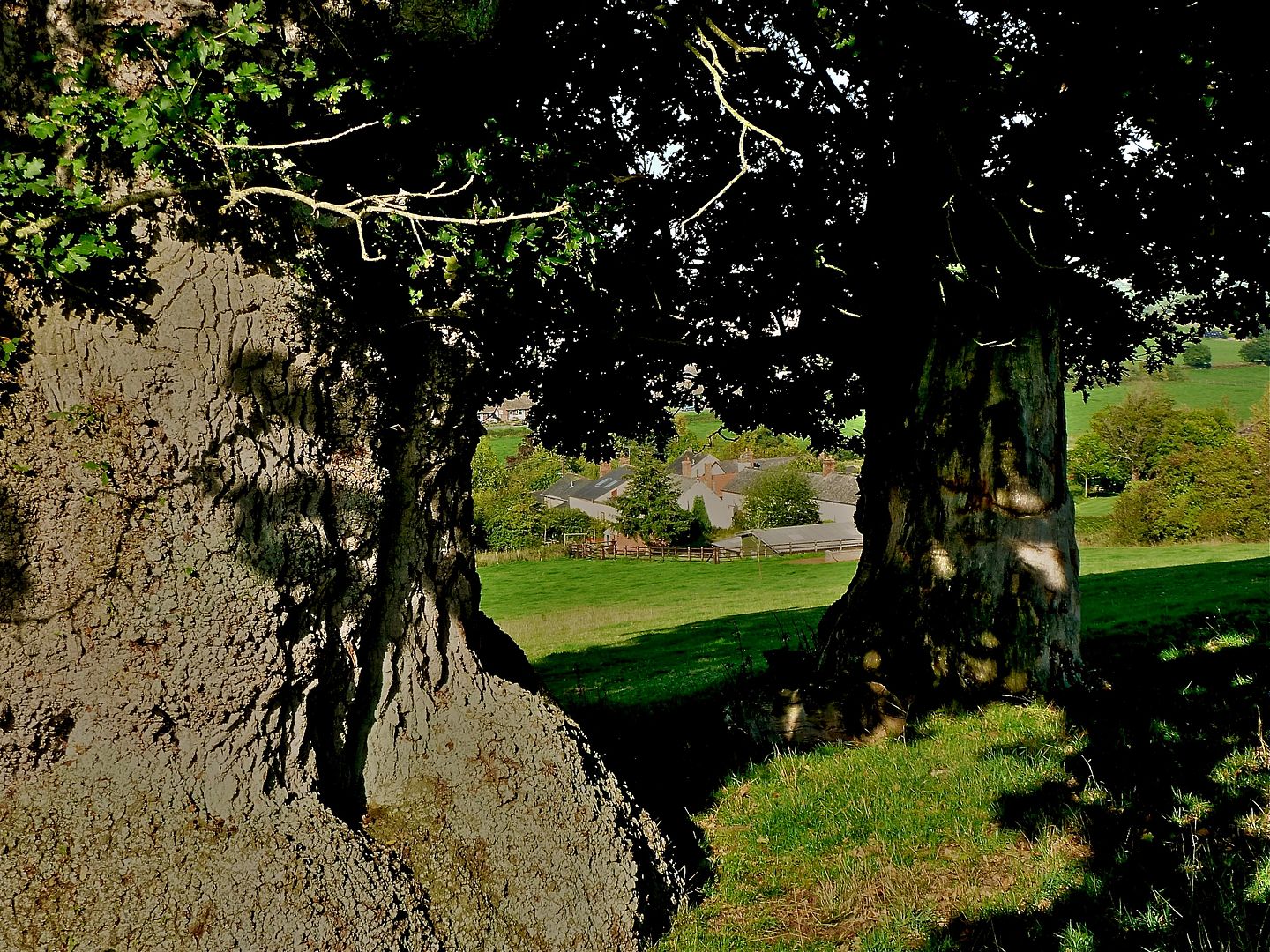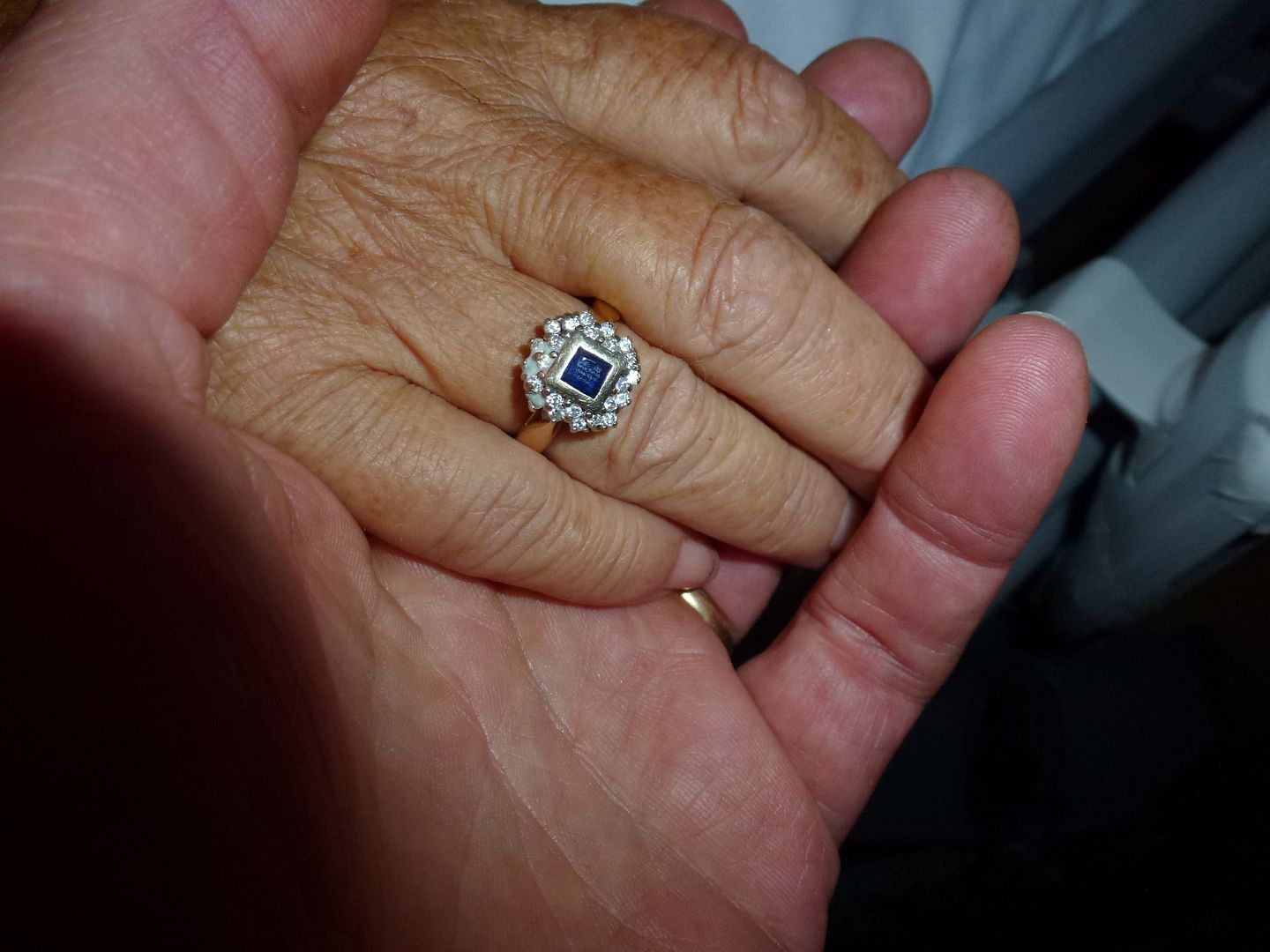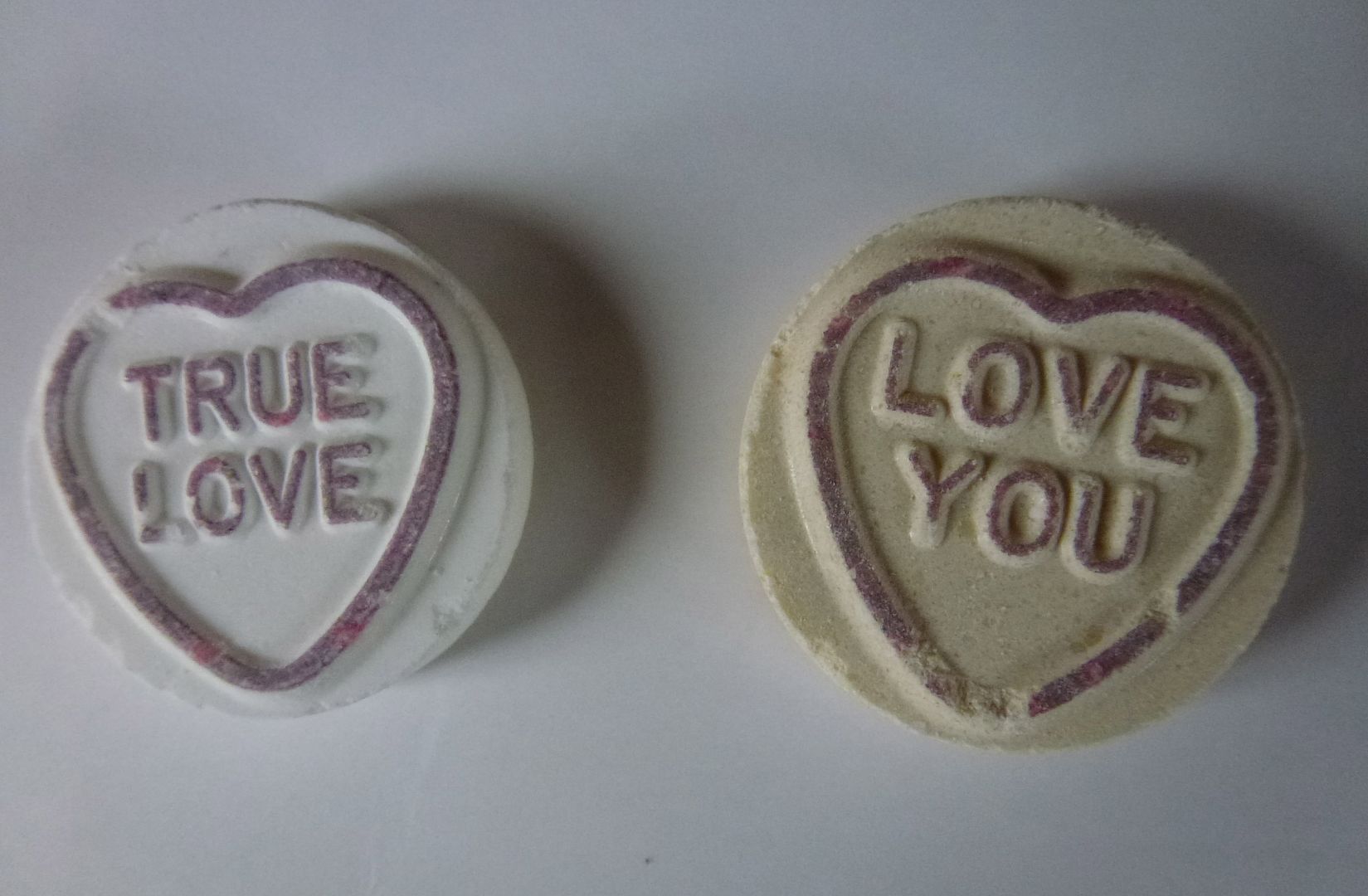There were other entries, but I've taken them down for one reason and another; there are literally thousands more photos, more memories. I may get around to posting some of those - the day I buried Chip under the oak tree, for instance – but to some extent this blog feels finished to me.
I've just revisited it, largely because all the photos were vulnerable to photobucket's no 3rd party policy, and I had to fix all the links to get it working again, but that also entailed reading it from beginning to end, with all the horror and wonder that entailed, and to be honest I feel like there's nothing that needs,that screams out,to be added. As long as I continue to pay the yearly ransom, which I will as long as live, the words and photos will stay here.
Last month I entered my 70th year, and I'm planning to get married to my new love, Em, and to move house (within the same village) to begin a new phase in my life, still more or less fit, and feeling amazingly fortunate both to have that chance and to have learned enough of love, of home, and the joys of life in my 30 years of Chipness to make the very best of it.
I love her still, but that doesn't mean I can't love other people, animals, things, and live with a full heart. She taught me that, and, future dementia aside, I will never forget it.
Or her.
Love Ray
X
The Days Are Just Packed
Not just another cancer diary
Wednesday, 15 November 2017
Thursday, 20 June 2013
Silver
Sunday week, 30 June, is our Silver Wedding Anniversary, and I will be burying Chip’s ashes, along with those of her beloved Kez, in the place she chose for them, under the oak trees in the parkland that rises behind the house, and which gives views over the house, garden, village and the sweep and roll of Deepest Devon beyond. This is the field where we were delighted to see hares play, and roe deer are a barely noticed commonplace.
Neither of us were particularly sentimental about, well, mortal remains, but both of us understood only too well the power of symbolism, and I will be sure to do it right.
Neither of us were particularly sentimental about, well, mortal remains, but both of us understood only too well the power of symbolism, and I will be sure to do it right.
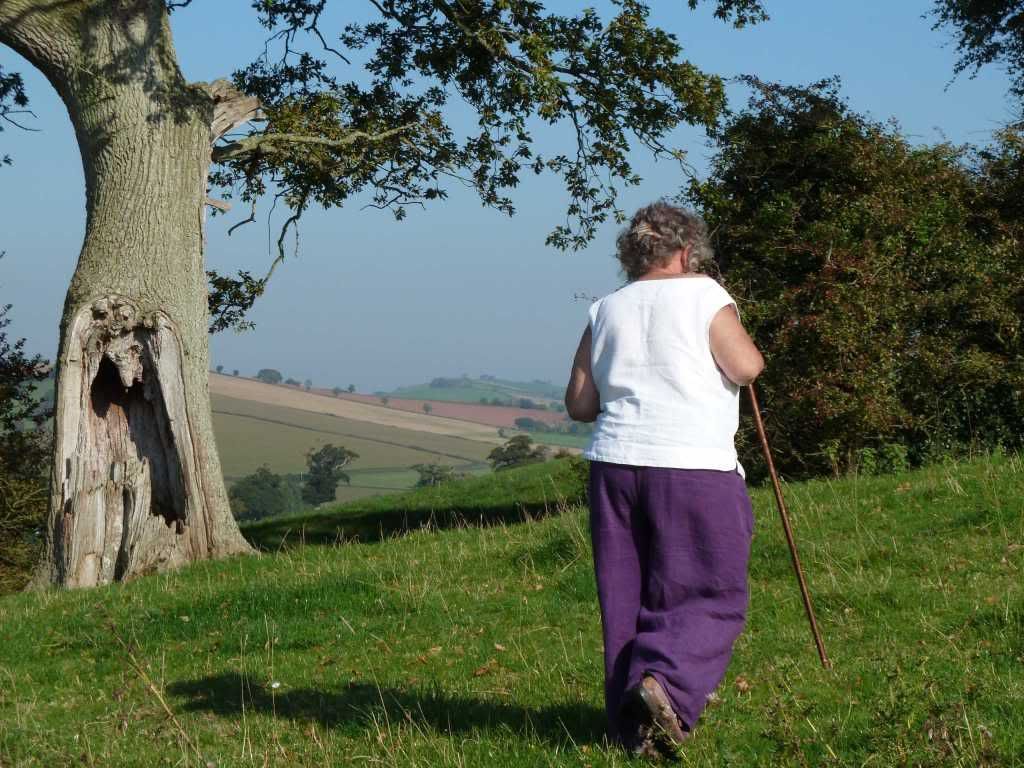 |
| We climbed the hill to select the site and admire the view on a gorgeously blue and hazy day at the end of September, 2011. |
Tuesday, 29 January 2013
yet another thing...
So now I have eight blogs. You can find your way the others by clicking on the name Rayge over there in the sidebar –––––––> to get my profile, which lists links to them all.
This blog I am keeping solely now for pictures and memories of my life with Chip.
There were some pictures here, but they were lost to the nonsense that is photobucket
This blog I am keeping solely now for pictures and memories of my life with Chip.
There were some pictures here, but they were lost to the nonsense that is photobucket
Sunday, 4 November 2012
and another thing...
I've been thinking about how to continue this blog, and think it would be best to leave it as a place to write about our relationship in the past tense, to celebrate Chip's life (and in a small way, mine) and the things we created together, specifically our homes
and gardens, past and present. I'm still engaged in the process of transferring 30 years of transparencies and prints into digital images, and I find blogging a congenial way of sharing them.
I'm also going to revive my 'dying light' blog for whatever artworks I can create or rediscover, and start a couple more: ScrapBook about my adventures with the puppy, and In Deepest Devon about the place I live and consider to be far more about who I really want to be than anywhere else I ever lived.
If anyone has any comments or suggestions, I'd be pleased to see them.
I'm also going to revive my 'dying light' blog for whatever artworks I can create or rediscover, and start a couple more: ScrapBook about my adventures with the puppy, and In Deepest Devon about the place I live and consider to be far more about who I really want to be than anywhere else I ever lived.
If anyone has any comments or suggestions, I'd be pleased to see them.
so, grief...
I expected the welling heartache, the tearing sense of loss, the hollow pain, the aching, slow, readjustment to a radically rearranged world. I've felt it before, to varying degrees: when my dad died, or a loved pet (fortunately have yet to lose a good friend to death), or I lost something of myself some other way. It's just another bereavement, I thought, harder and more intense than the rest, sure, but it's familiar territory, I have the map, I'll find my way to the other side.
I was wrong. This time there's a triple threat: along with the exquisitely distilled sorrow, there is horror and fear. The horror comes in sudden images from Chip's final month, like a slap in the face from an invisible hand: I'm not talking grand guignol horror (although there was a little bit of that), just the way that the disease took life from her bit by bit, slow and inexorable as a glacier, grinding away at that magnificent spirit until it was reduced to a simple need for help; awful, in the fullest sense of the word. I had to suppress these feelings to get by, to provide the only help I could give, simply by being there to the end, but after the slap in the face (you remember, a mixed metaphor or two ago), it comes back, and I have to feel it now, damp-faced and shivering.
And the fear – anxiety is a better word – manifests itself in many ways. All through our 30-year relationship, Chip was the worrier – her glass wasn't so much half empty as smashed to pieces on the floor, its erstwhile contents irretrievably staining a prized Persian rug. My role was to be a reassurer. Now she's gone, though, I seem to have taken it on (anyone here who's read Alfred Bester's The Pi Man will know how this works). Scrap has diarrhoea (always outdoors I'm pleased to report) and I'm assuming virus at best, fatal congenital condition a possibility, normal puppy development an unlikely tale. A few floaters have appeared in my left eye, and I'm thinking macular degeneration or detaching retina, but can't get an appointment with an optician until tomorrow.
Previously, I have always been able to reassure myself by relying on a natural resilience and good health, as well as a history of making the right decisions in a crisis, but the last year or so have taken so much out of me physically, emotionally and spiritually, that I don't think I can take another hit right now without sustaining some permanent damage, so I'm over-protective and fearful.
I have to keep reminding myself that 'It's only been x weeks [currently x=8] since Chip died, you can't expect to be anything other than you are right now,' but in one sense it seems an age, and another it's still happening now. I'm more or less fully functional in terms of getting out in the world, talking to people, 'acting normal', doing what needs to be done, but at the same time, I'm (temporarily, I continue to hope) also insane.
I was wrong. This time there's a triple threat: along with the exquisitely distilled sorrow, there is horror and fear. The horror comes in sudden images from Chip's final month, like a slap in the face from an invisible hand: I'm not talking grand guignol horror (although there was a little bit of that), just the way that the disease took life from her bit by bit, slow and inexorable as a glacier, grinding away at that magnificent spirit until it was reduced to a simple need for help; awful, in the fullest sense of the word. I had to suppress these feelings to get by, to provide the only help I could give, simply by being there to the end, but after the slap in the face (you remember, a mixed metaphor or two ago), it comes back, and I have to feel it now, damp-faced and shivering.
And the fear – anxiety is a better word – manifests itself in many ways. All through our 30-year relationship, Chip was the worrier – her glass wasn't so much half empty as smashed to pieces on the floor, its erstwhile contents irretrievably staining a prized Persian rug. My role was to be a reassurer. Now she's gone, though, I seem to have taken it on (anyone here who's read Alfred Bester's The Pi Man will know how this works). Scrap has diarrhoea (always outdoors I'm pleased to report) and I'm assuming virus at best, fatal congenital condition a possibility, normal puppy development an unlikely tale. A few floaters have appeared in my left eye, and I'm thinking macular degeneration or detaching retina, but can't get an appointment with an optician until tomorrow.
Previously, I have always been able to reassure myself by relying on a natural resilience and good health, as well as a history of making the right decisions in a crisis, but the last year or so have taken so much out of me physically, emotionally and spiritually, that I don't think I can take another hit right now without sustaining some permanent damage, so I'm over-protective and fearful.
I have to keep reminding myself that 'It's only been x weeks [currently x=8] since Chip died, you can't expect to be anything other than you are right now,' but in one sense it seems an age, and another it's still happening now. I'm more or less fully functional in terms of getting out in the world, talking to people, 'acting normal', doing what needs to be done, but at the same time, I'm (temporarily, I continue to hope) also insane.
Wednesday, 10 October 2012
So how have you been, Ray...
...and the simplest answer, and the one I'm inclined to give whenever the question is put to me in person, is, 'I'm all right,' even though the last thing that 'all' is, is right. The problem with trying to say something more profound, or accurate, is that the process of grief, of sorting through the emotions, of recovering from the necessary insanity of Chip's last few weeks, when I had to suppress all that rage, horror and awe, and ignore the sense of loss gnawing and tearing away, is an amphetamine rollercoaster with more twists than a Tory and a tendency to jump the tracks every now and then and plummet into darkness. It is it difficult to say anything cogent, with things changing all the while – not just from day to day, but minute by minute sometimes. Quite a lot of the time, though, I'm rather enjoying the ride – all that LSD I took back in the day has prepped me well for periods of temporary insanity – which is why I say 'all right'.
I intend to keep this blog going with photos and stories about our relationship, while I make a new one about what happens next. In the meantime, for those who have not seen it, there was an obit of Chip in the Daily Telegraph:
http://www.telegraph.co.uk/news/obituaries/culture-obituaries/books-obituaries/9574999/Pip-Granger.html .
Here it is in full:
I intend to keep this blog going with photos and stories about our relationship, while I make a new one about what happens next. In the meantime, for those who have not seen it, there was an obit of Chip in the Daily Telegraph:
http://www.telegraph.co.uk/news/obituaries/culture-obituaries/books-obituaries/9574999/Pip-Granger.html .
Here it is in full:
"Pip Granger
Pip Granger, who has died of cancer aged 65, was the daughter of a pornographer and smuggler-turned-mail-order-astrologer and drew on her “bohemian-criminal” childhood in a series of interconnected novels set in working-class Soho in the 1950s.
The novels, which began with Not All Tarts Are Apple (2002), mainly focused around the life of Rosie, the daughter of a prostitute and alcoholic born in the East End of London who is taken in by a couple living over a Soho café, where she grows up surrounded by a colourful cast of low-life characters such as con artists, shyster lawyers, cross-dressers, prostitutes, fortune tellers and thieves — all big-hearted sinners who live on the margins, befriend young Rosie and protect her from harm.
Laced with
cockney slang, Pip Granger’s four novels — the others are The Widow
Ginger (2003), Trouble in Paradise (2004) and No Peace for the Wicked
(2005) — are full of convincing period detail, evoking a picaresque
world that largely vanished following the introduction of the 1959
Street Offences Act and the arrival of the “Swinging Sixties”. Not All
Tarts Are Apple won the Harry Bowling Prize for fiction.
In Alone, a memoir which became a bestseller when it was published in
2006, Pip Granger showed how close young Rosie’s experience was to her
own.
She was born Patricia
Jacqueline Priscilla Cliff on July 26 1947 at Cuckfield, Sussex, and was
always known to her friends as “Chip”. Both her parents were
alcoholics, and her early childhood was marked by blazing rows and
drink-fulled accidents. Just after her first birthday her family was
evicted from their cottage for non-payment of rent — a pattern that
would recur at intervals.
Her
parents separated when she was five and, neglected by both, Pip and her
older brother Peter were largely left to fend for themselves. They
shuttled between homes in overspill estates around Dagenham, where their
mother worked as a teacher, and their father’s top-floor flat above the
Two Is coffee bar in Old Compton Street.
He had made money publishing pulp fiction in the
Second World War, but subsequently lost everything. During Pip’s
childhood he sold erotic literature, smuggled in from the Continent, and
wrote radio scripts, though he spent much of his time in Soho’s pubs
and cafés, snooker halls and more dubious establishments, acquiring
friends ranging from The Goons to gangsters such as the Richardson
brothers and “Mad Frankie” Fraser (with whom he played poker). A
qualified pilot, he also flew light aircraft, in which he would
sometimes take his daughter on trips to the French Riviera, returning
with the plane loaded with smuggled brandy, tobacco and books. Later he
became a mail order astrologer.
As a child Pip was never aware that her father was involved in anything shady or illegal; neither did his bohemian lifestyle make her feel different to her friends: “In Soho,” she recalled, “such people were thick on the ground.” One of her father’s best customers (for the erotic literature rather than the contraband hooch) was the Italian tenor Beniamino Gigli, who would serenade her while he waited to be served. Famous names such as Elizabeth Taylor, Rita Hayworth and Fred Astaire, regular visitors to Soho, would stop for a chat ; Annie Ross lived on the floor below; and Pip recalled bumping into Billie Holliday on the stairs.
But her most vivid memories were of Soho’s market traders, shopkeepers, craftsmen and, above all, the prostitutes, whom she recalled as being mostly French and “looking amazing”. “Prostitutes openly plying their trade was a common sight in Soho back then,” she recalled. “In fact it was these working girls that kept the streets safe. They would watch over children if their parents were at work... Before the Street Offences Act of 1959 life was lived far more out in the open and on the streets — there were always children playing and people selling things.”
Pip recalled that very few residents of Soho had a bathroom, so once a week a procession would make its way to the community baths: “We were all a bit grubby, but that was the way it was so it was just accepted.” The sleazy element of Soho, which she felt was much exaggerated in the press, was provided mainly by street traders selling dodgy photos: “They had handfuls of Brylcreem in their hair, so much that it looked like patent leather,” she recalled in an interview. “They’d have trilby hats, big lapelled suits and wide turn-up trousers. They always had great big wodges of folded-up notes and would hiss out of the side of their mouths to would-be punters.”
After leaving school Pip Granger worked in an office for a while and later trained as a special needs teacher. In Westminster she taught children who had been excluded from school. In the 1970s and 1980s she worked in Stoke Newington and Hackney.
Eventually forced to quit teaching due to ill health, she turned to writing, first non-fiction partworks. She began writing fiction in the 1990s when her brother was diagnosed with brain cancer. Her novels were a way of remembering their shared childhood. Yet she remained prouder of her successes in turning around the lives of children with behavioural and learning difficulties than she was of her writing.
Pip Granger observed that the energy of life in Soho in the Forties and Fifties came from people who had endured the war and whose “need to Live, with a capital L, was urgent”. Soho represented a refuge for those who wished to escape the restrictions of a Britain still in the grip of post-war austerity and curtain-twitching respectability. Her last book, Up West, published in 2009, was described as an “emotional history” of the West End, particularly Soho and Covent Garden, during the area’s bohemian heyday in the two decades between VE-Day and the mid-1960s.
Pip Granger’s first marriage ended in divorce, and in 1988 she married Ray Granger, with whom she moved to a house in North Somerset. They shared a love of wildlife and gardening and she wrote most of her books in a shed in a wildlife garden that they created together.
Her husband survives her.
Pip Granger, born July 26 1947, died September 8 2012"
As a child Pip was never aware that her father was involved in anything shady or illegal; neither did his bohemian lifestyle make her feel different to her friends: “In Soho,” she recalled, “such people were thick on the ground.” One of her father’s best customers (for the erotic literature rather than the contraband hooch) was the Italian tenor Beniamino Gigli, who would serenade her while he waited to be served. Famous names such as Elizabeth Taylor, Rita Hayworth and Fred Astaire, regular visitors to Soho, would stop for a chat ; Annie Ross lived on the floor below; and Pip recalled bumping into Billie Holliday on the stairs.
But her most vivid memories were of Soho’s market traders, shopkeepers, craftsmen and, above all, the prostitutes, whom she recalled as being mostly French and “looking amazing”. “Prostitutes openly plying their trade was a common sight in Soho back then,” she recalled. “In fact it was these working girls that kept the streets safe. They would watch over children if their parents were at work... Before the Street Offences Act of 1959 life was lived far more out in the open and on the streets — there were always children playing and people selling things.”
Pip recalled that very few residents of Soho had a bathroom, so once a week a procession would make its way to the community baths: “We were all a bit grubby, but that was the way it was so it was just accepted.” The sleazy element of Soho, which she felt was much exaggerated in the press, was provided mainly by street traders selling dodgy photos: “They had handfuls of Brylcreem in their hair, so much that it looked like patent leather,” she recalled in an interview. “They’d have trilby hats, big lapelled suits and wide turn-up trousers. They always had great big wodges of folded-up notes and would hiss out of the side of their mouths to would-be punters.”
After leaving school Pip Granger worked in an office for a while and later trained as a special needs teacher. In Westminster she taught children who had been excluded from school. In the 1970s and 1980s she worked in Stoke Newington and Hackney.
Eventually forced to quit teaching due to ill health, she turned to writing, first non-fiction partworks. She began writing fiction in the 1990s when her brother was diagnosed with brain cancer. Her novels were a way of remembering their shared childhood. Yet she remained prouder of her successes in turning around the lives of children with behavioural and learning difficulties than she was of her writing.
Pip Granger observed that the energy of life in Soho in the Forties and Fifties came from people who had endured the war and whose “need to Live, with a capital L, was urgent”. Soho represented a refuge for those who wished to escape the restrictions of a Britain still in the grip of post-war austerity and curtain-twitching respectability. Her last book, Up West, published in 2009, was described as an “emotional history” of the West End, particularly Soho and Covent Garden, during the area’s bohemian heyday in the two decades between VE-Day and the mid-1960s.
Pip Granger’s first marriage ended in divorce, and in 1988 she married Ray Granger, with whom she moved to a house in North Somerset. They shared a love of wildlife and gardening and she wrote most of her books in a shed in a wildlife garden that they created together.
Her husband survives her.
Pip Granger, born July 26 1947, died September 8 2012"
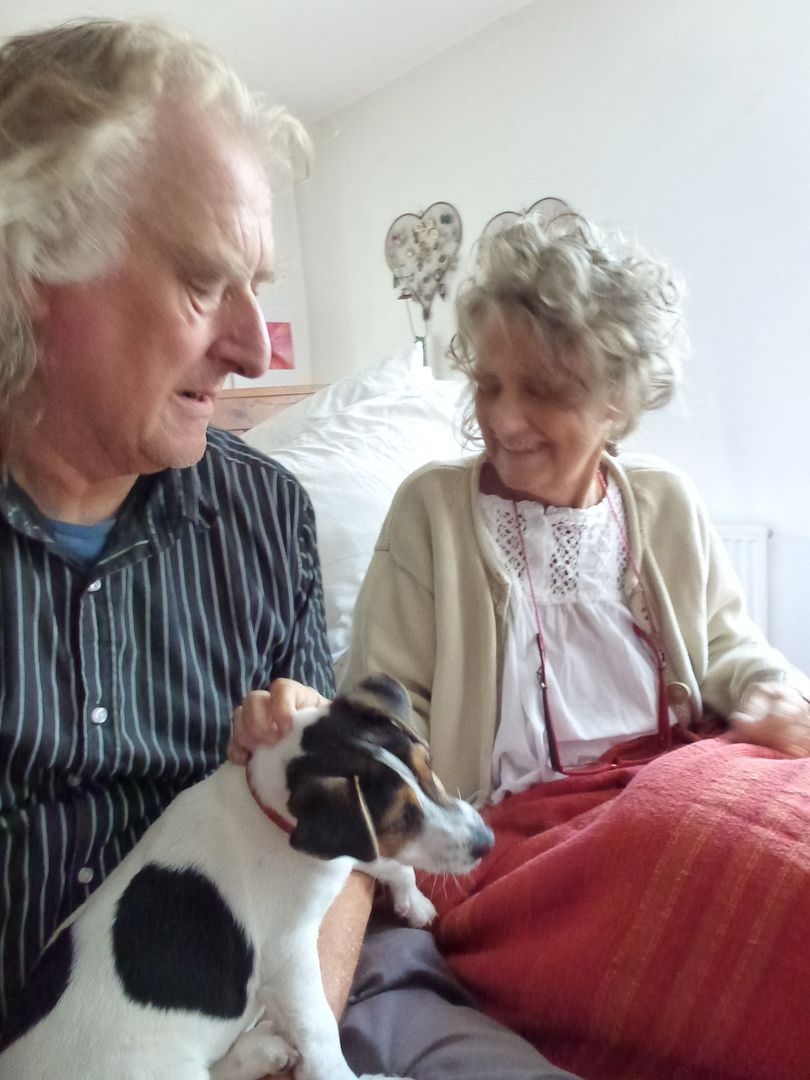 |
| The last pic of Chip and I together and the only one featuring The Scrap |
Friday, 7 September 2012
Subscribe to:
Comments (Atom)
